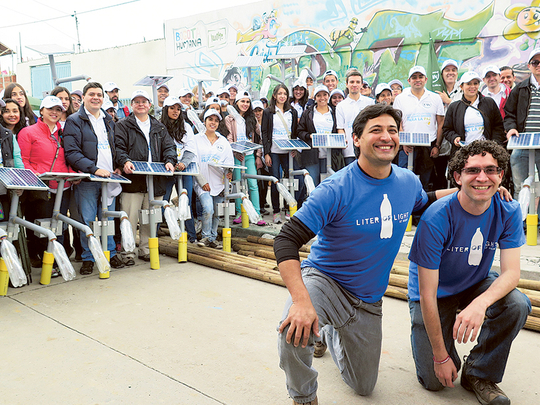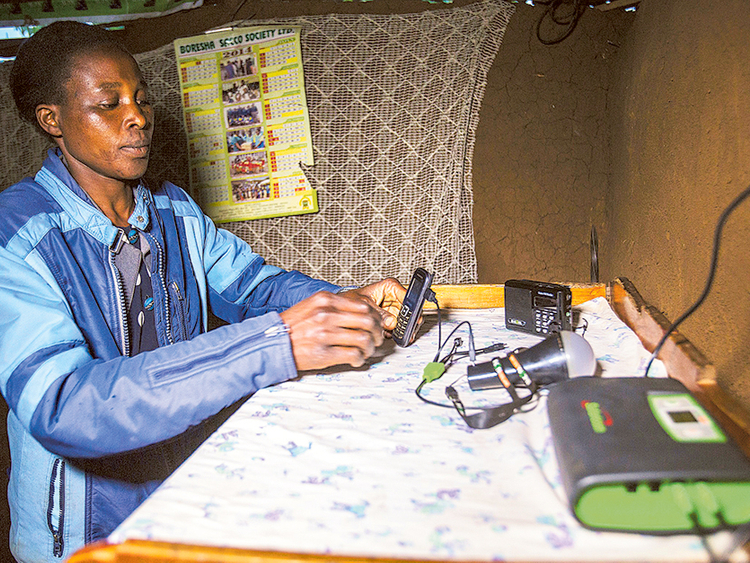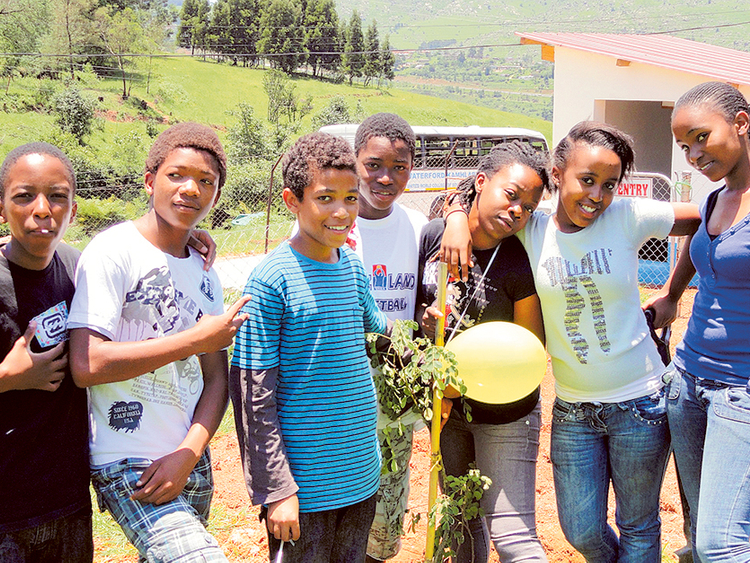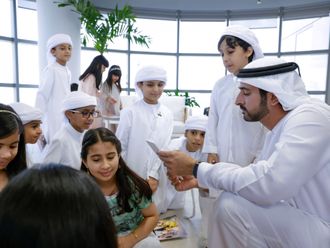
The Zayed Future Energy Prize, the world’s premier award for innovative contributions to the future of energy and sustainable development, represents the vision of the late founding father of UAE, Shaikh Zayed Bin Sultan Al Nahyan, who was deeply committed to environmental progress and championed its cause. This annual award celebrates achievements that reflect impact, innovation, long-term vision and leadership in renewable energy and sustainability.
With the 2016 chapter of the Zayed Future Energy Awards to be held on January 18 during the Abu Dhabi Sustainability Week (January 16-21), we look at the impact the award has had on its winners and how it concretises their ambitions of making a positive difference to the planet.
Gulf News speaks to three award-winners from 2015 to know how the prize brought them world recognition and put them firmly on the path to greater success.
M-KOPA Solar (M-KOPA): Smart ideas whose time has come
Launched in October 2012, M-KOPA Solar is the market leader in ‘pay-as-you-go’ energy services for off-grid customers — combining mobile payments with GSM sensor technology to enable the leasing of solar power systems. It was created on the founders’ belief that mobile technology could create a leapfrog opportunity in energy and address a huge market need. Across Africa and South Asia, one billion off-grid homes spend a combined $50 billion (Dh183.65 billion) per year on fuel substitutes.
Impact of Zayed Future Energy Prize
M-KOPA’s founder Jesse More: The Prize has brought global attention to M-KOPA’s business and is helping us build a team that can bring affordable solar energy to millions of off- grid homes. The Prize has also helped take the entire off grid pay-as-you-go solar category to the next level.
The Prize funds have been used to build a companywide training and development programme, “M-KOPA U”. The programme will provide world-class technical and skills development to over 1,500 members of staff in the next three years.
As of May 2015, we had connected 200,000 homes, which was an amazing milestone for us. Today, just eight months later, we have reached 300,000 households. We have become one of the fastest growing power providers in the region connecting solar to 500 new homes each day.
The future
We are expanding our footprint across East Africa with operations in Tanzania and Uganda. We have just launched our next generation product, the M-KOPA 4. It is upgradeable to more lights and, once the annual payment plan in completed, it can be upgraded to run a digital TV.
M-KOPA is also branching out from core solar home systems to additional practical products. Our customers can now access energy-efficient cooking stoves, smartphones and water tanks on a pay-as-you-go basis — using their solar home systems as collateral.
For low-income homes that are off grid, we passionately believe that the future lies on your rooftop. Affordable solar home systems provide a clean and sustainable opportunity for billions of people to ‘leapfrog’ the grid. We are also showing that affordable energy is truly transformative — it helps you be more productive, have more money in your pocket and it opens up a world of other products and services to you.
Waterford Kamhlaba: Change at the grass roots level
Waterford Kamhlaba United World College of Southern Africa (WK UWCSA), founded in 1963 in Mbabane, Swaziland, is one of Africa’s first multiracial schools. Waterford Kamhlaba provides opportunities for academic achievement, personal growth, and leadership development for youth across Africa and the world.
Impact of winning the Zayed Future Energy Prize
It has allowed Waterford Kamhlaba stakeholders to unite in facing the global challenges facing us. The enthusiasm and inspiration generated on winning the prize was amazing, and allowed Waterford Kamhlaba the opportunity to put the Sustainable Energy agenda firmly on our map. From a previously ‘talked about’ concept, our theory in now firmly in practice.
Number of students that have taken part in the project since winning the Zayed Future Energy Prize:
32
Number of students that have benefited from the project since winning the prize:
626
How was the project implemented after winning the prize?
Twelve students were selected to implement the project and split into teams: wind energy, biodigester, solar PV, solar thermal, efficiencies, measurement and education.
The installation of our wind turbine in a high-visibility location has raised awareness and excitement about renewable energy among our student body. This increased awareness has kick-started the ‘energy conversation’.
The future
Shaikh Zayed’s visionary legacy has allowed Waterford Kamhlaba to embark on the journey towards sustainability — a journey the world needs in order to secure our future for all generations to come.
Litre of Light Philippines: solar power within reach
Litre of Light is a global open source movement that aims to provide ecologically sustainable and cost-free lighting for simple dwellings with thin roofs. It offers a zero-carbon-emitting alternative to the daytime use of electric or hydrocarbon-burning (kerosene, gas) illumination.
[The Liter of Light device: a 1.5—2 L clear plastic bottle is filled with water plus a little bleach to inhibit algal growth and fitted into a hole in a roof. The device acts as a deck prism: during daytime the water inside the bottle refracts sunlight, delivering about as much light as a 40—60 watt incandescent bulb. A properly installed solar bottle can last up to five years.]
Impact of winning the Zayed Energy prize
Founder of Liter of Light, Illac Diaz: Since winning the 2015 Zayed Future Energy Prize, Liter of Light has lit up over 120,000 homes in the Philippines and more than 400,000 homes around the world and counting. We have expanded and now have chapters in over 15 countries, including Mexico, Colombia, Dominican Republic, Chile, Brazil, Italy, France, Switzerland, Morocco, Senegal, Ghana, India, Pakistan, Malaysia, Indonesia, and Afghanistan.
Hundreds of volunteers have joined the movement since hearing of our recognition by ZFEP and many more thousands have become aware of our existence and of the power and success of grass roots solutions through our online training and materials which we make available to anyone who wants to learn how to build their own lights.
ZFEP’s endorsement of Liter of Light is a testimony to Shaikh Zayed’s deep belief in the power that sustainable, grass roots solutions have to create a better future for our planet.
The future Using the momentum of the International Year of Light, which started with our Zayed Future Energy Prize award, Liter of Light has expanded its breadth and reach by training new chapters on our solar night-light and street light technology, with the goal of lighting up one million lives by 2017.
Among our greatest achievements since winning the prize has been new communities [approaching] us for solutions, from Afghanistan to Zambales, Philippines, to educate them about our do-it-yourself solar lighting solutions.
The Prize as a catalyst
The Zayed Future Prize has enabled the concept that in solving energy poverty, developing countries were not just waiting for solutions, but have innovative and rapidly escalating solutions that work much ingenuity with little funds. Simple solutions put in the hands of millions was more sustainable and replicable than something imported that no one knew how it worked and how it could be maintained.
This gave us the dignity of doing our part in fighting energy poverty. [It’s not about] high tech, high cost, but also about low tech, high impact.
Recently, we had the full Congress of the Philippines come together and build hundreds of street lights where each congressman and his staff assembled a circuit and the posts from scratch.
Internationally, we have been invited to put up Liter of Light Pavilions as far away as Chile and Mexico. We also have been invited to do a workshop for Masdar Festival [during the Abu Dhabi Sustainability Week).
Zayed Energy Prize finalists for 2016
The finalists in each category of the 2016 Zayed Future Energy Prize are:
Large Corporation: BYD (China), Iberdrola (Spain) and Infosys (India)
SME (Small and Mdium Entreprenuer): Green Energy & Biofuels (Nigeria), Greenlight Planet (India) and Off. Grid: Electric (Tanzania)
NPO (Non-profit Organisation): Kopernik (Indonesia), SNV Netherlands Development Organisation (Netherlands), SolarAid (United Kingdom) and Rural Services Foundation (Bangladesh)
Global High Schools
Africa: Mfantsipim School (Ghana), SOS HG Sheikh Secondary School (Somalia) and Abaarso School of Science and Technology (Somalia)
The Americas: Manuel Picasuti High School (Bolivia), Professional Technical High School Juanacatlán (CONALEP131, Mexico) and Institucion Educativa Gabriel Plazas (Columbia)
Asia: Mahindra United World College of India, Royal College (Sri Lanka) and Korea Science Academy of KAIST
Europe: Belvedere College (Ireland) and Schuelerforschungszentrum Suedwuerttemberg (Germany)
Oceania: Cashmere High School (New Zealand), Huonville High School (Australia) and Lume Rural Training Center (Vanuatu)














